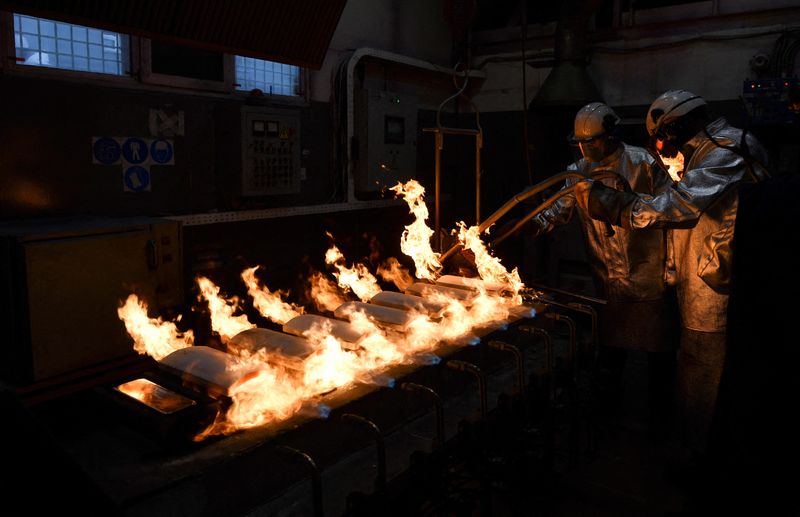Tom Westbrook
SINGAPORE (Reuters) – Gold hit a record high and bonds rose on Wednesday as markets braced for lower global interest rates, while Taiwanese shares fell after U.S. presidential candidate Donald Trump sounded reluctant to come to the island’s defence.
The pound strengthened after UK inflation stood at just 2% year-on-year in June, compared with an expected 1.9%, and services inflation languished at 5.7%.
FTSE futures rose 0.2% and S&P 500 futures fell 0.2% after the spot index hit a record high on Wednesday.
MSCI’s broad index of Asia-Pacific shares ex-Japan was flat, while Japan’s Nikkei fell 0.4%.
In Taiwan, shares in chipmaker TSMC fell 3%, wiping out nearly $30 billion from its market capitalization, after President Trump questioned U.S. aid in an interview with Bloomberg Businessweek and said Taiwan should pay for U.S. protection.
It is unclear what exactly Trump plans to do, but his selection of trade hawk J.D. Vance as his running mate has already signaled to markets that China will feature prominently in his foreign policy thinking.
Chinese stocks were weak for a second consecutive day.
The Taiwan dollar weakened slightly to its lowest in two weeks, while China’s yuan held steady at 7.2673 to the dollar as markets await the outcome of a leadership meeting in Beijing that ends on Thursday.
With Trump expected to impose tariffs and widen the budget deficit, “it’s becoming increasingly clear that President Trump should be bullish on the U.S. dollar, at least for a while,” said Brent Donnelly, president of analytics firm Spectra Markets.
Regarding the dollar/yuan, he said, “With Trump’s victory in November, it is hard to imagine the US dollar/yuan rate ending below 7.25 at the end of 2024, but it is not hard to imagine it ending above 7.50.”
Elsewhere in the technology sector, ASML, the largest maker of equipment for chipmakers, reported better-than-expected second-quarter profit and its shares are expected to open higher.
Gold Glitter
In Asia, New Zealand shares hit their highest since March 2022 after data showed inflation slowing, while interest rate markets fell and the currency strengthened as domestically-driven inflation took hold.[.AX][NZD/]
Treasuries held on to gains, with the 10-year Treasury yield falling to a four-month low overnight, after Federal Reserve Chairman Jerome Powell said recent declines in inflation measures “provide some increased confidence” that consumer prices are being contained.
Federal funds rate futures are fully pricing in a cut in U.S. interest rates in September, followed by two more cuts by the end of January 2025.
The 10-year yield was stable at 4.167%, while the 2-year yield was at 4.44%. Bond markets in Australia, Japan and South Korea rose. [JP/][.KS]
The decline in yields has sent gold prices soaring, breaking through chart resistance near $2,450 an ounce despite a broadly firm dollar. Gold hit a record high of $2,482 in Asian trading on Wednesday. [GOL/]
“It’s been remarkable this year how gold has been able to find support in any condition,” said Vivek Dhar, commodities strategist at Commonwealth Bank of Australia.
“We believe gold prices will face uncertainty in the coming months, but that uncertainty is tilted to the positive, increasing the risk that gold prices will exceed our forecast of $2,500 an ounce by the end of the year.”
The Japanese yen was stable at 157.9 yen, down sharply from a 38-year low of 161.96 yen hit in early July following what appeared to be multiple Japanese interventions over the weekend.
The euro was steady at $1.0905.
Oil prices edged lower on signs that demand from China was weakening.
Brent crude futures fell 9 cents to $83.64 a barrel, while U.S. crude futures fell 7 cents to $80.69 a barrel. [O/R]
(Editing by Sam Holmes and Kim Coghill)


